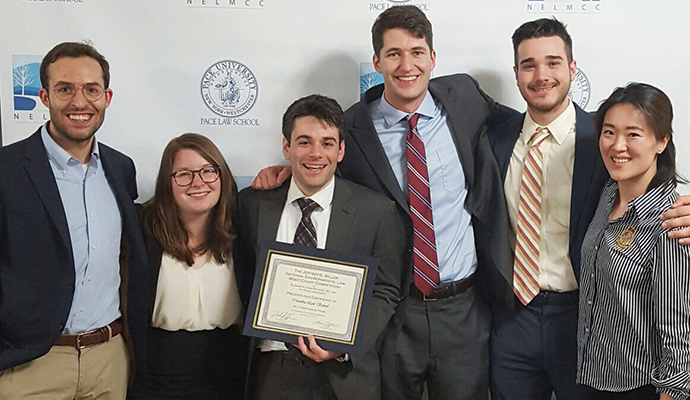Environmental Moot Court Team Snags First Victory
The 2017 Environmental Law Moot Court team and coaches, from left to right: Anthony Raduazo ’18, Dorothy Weldon ’19, Jeremy Patashnik ’19, Scott Ferron ’19, Michael Lanci ’18, and Young Choi ’18. |
Dorothy Weldon ’19, Scott Ferron ’19, and Jeremy Patashnik ’19 made history last weekend, becoming the first Columbia Law School team to win the annual Jeffrey G. Miller National Environmental Law Moot Court Competition at Pace University. It is the largest interschool moot court competition of any kind under one roof. As the only team made up solely of 1L students, Weldon, Ferron, and Patashnik defeated 63 teams from law schools across the country, working on a problem concerning a regulatory takings claim under the Endangered Species Act.
Arguing before a panel of federal judges in the final round—including Bernice B. Donald of the U.S. Court of Appeals for the 6th Circuit, James E. Graves, Jr., of the U.S. Court of Appeals for the 5th Circuit, Stephen A. Higginson of the U.S. Court of Appeals for the 5th Circuit, Thomas I. Vanaskie of the United States Court of Appeals for the 3rd Circuit, and Mary Kay Lynch of EPA’s Environmental Appeals Board—the Law School team overtook teams from the University of Connecticut School of Law and Stetson University College of Law. In addition, Ferron and Patashnik each won awards for their compelling performances in two of the preliminary rounds.
In preparation for the competition, the Law School team benefited from having been coached by 2Ls Young Choi ’18, Michael Lanci ’18, and Anthony Raduazo ’18, as well as their faculty adviser, Susan E. Amron ’84, chief of the environmental law division of the New York City Law Department and a lecturer at the Law School. Professors Michael Heller, Thomas Merrill, Gillian Metzger ’96, and Elizabeth Scott also provided assistance to the students.
“We’re thrilled to have represented Columbia at the competition,” said Ferron after his team’s victory. “It was especially an honor to have had the opportunity to argue before such a distinguished panel of judges in the final round. We couldn’t be more grateful to our 2L coaches, who helped us puzzle through the wide variety of legal issues in the problem, including property, constitutional, administrative, and tort law.”
“We’re really appreciative of the institutional knowledge that our coaches—and their coaches before them—passed down to us and for the incredible amount of time they devoted to preparing us for oral arguments,” added Patashnik.
Columbia Law School’s Moot Court Program is made possible by the support of Paul, Weiss, Rifkind, Wharton & Garrison. The 2017 environmental law moot court marked the first time a Law School team has advanced to the final rounds in that competition since it began in 1989.
###
Posted February 27, 2017
